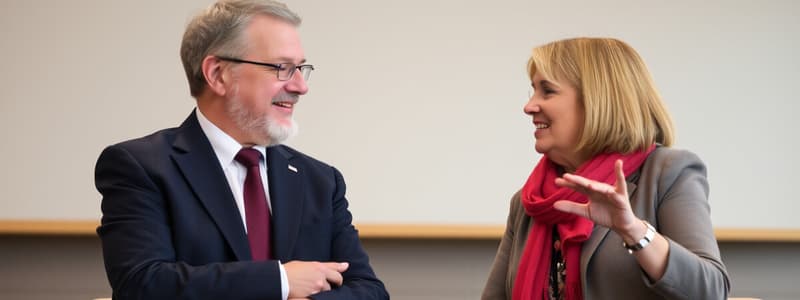Podcast
Questions and Answers
What is civility?
What is civility?
- The choice we make to consider others' thoughts and feelings (correct)
- The choice to ignore others' feelings
- A system of rules
- A form of impersonal communication
What defines civil communication?
What defines civil communication?
- Communication on the basis of respect, restraint, and responsibility (correct)
- Communication based solely on personal feelings
- Communication that is often rude
- Communication that ignores the audience
What are deontological ethics?
What are deontological ethics?
Ethics concerning principles, rules, and duties
What do consequentialist ethics examine?
What do consequentialist ethics examine?
Define ethics.
Define ethics.
What are symbols in communication?
What are symbols in communication?
What is a transaction in the context of communication?
What is a transaction in the context of communication?
What does the process of communication refer to?
What does the process of communication refer to?
Define intrapersonal communication.
Define intrapersonal communication.
What is self-talk?
What is self-talk?
What are parts of communication?
What are parts of communication?
What is the role of feedback in communication?
What is the role of feedback in communication?
Define noise in the context of communication.
Define noise in the context of communication.
What does context refer to in communication?
What does context refer to in communication?
What is workplace incivility?
What is workplace incivility?
What does agonism entail?
What does agonism entail?
Communication is a reversible process.
Communication is a reversible process.
What are the three communication facts?
What are the three communication facts?
Flashcards are hidden until you start studying
Study Notes
Civility and Civil Communication
- Civility involves considering others' thoughts and feelings during communication and behavior.
- Civil communication is characterized by respect, restraint, and responsibility in interactions.
Ethical Theories
- Deontological ethics focus on principles, rules, and duties concerning ethical behavior.
- Consequentialist ethics assess the relationship between outcomes and the means used to achieve them.
Understanding Ethics
- Ethics encompasses a system of standards that define right and good behavior, guiding choices in communication.
Communication Fundamentals
- Symbols represent tangible objects or abstract concepts, fundamental to conveying meaning.
- Communication is an ongoing, continuous process aimed at creating and sharing meaning.
Types of Communication
- Intrapersonal communication occurs internally through self-talk and internal dialogues.
- Interpersonal communication involves two or more people in a relationship that affects behavior mutually.
- Impersonal communication treats others as objects or roles, lacking personal engagement.
- Personal communication is based on uniqueness and individual interactions.
- Small group communication involves a few individuals (typically 3-12) interacting towards a common goal.
- Public communication transmits messages from a speaker to an audience.
- Mediated communication uses technology to convey messages (e.g. TV, Internet).
Communication Models
- Communication models illustrate the key components of communication and their interrelations.
- Action and interaction feedback models incorrectly depict communication as a one-way process.
- The transactional model demonstrates two-way communication, emphasizing shared influence.
Message Delivery
- The sender transmits thoughts, feelings, or ideas to a receiver, who interprets and responds to the message.
- Encoding transforms thoughts into symbols (words and nonverbal cues), while decoding interprets the message.
- A message comprises the information conveyed, utilizing both verbal and nonverbal communication.
- Feedback is the receiver's response to the sender, indicating if the message was understood as intended.
Communication Mechanics
- The channel refers to the medium through which a message travels between sender and receiver.
- Noise represents any interference that disrupts the communication process.
Context and Culture
- Context includes the physical environment, situational factors, and shared cultural elements that affect communication.
- Culture is characterized by shared assumptions, values, and beliefs of a group, shaping communication styles.
- Contexts of communication include cultural, workplace, and gender influences.
Workplace Behavior
- Workplace incivility involves rude, disrespectful behaviors that disregard others.
- Gender influences communication based on environmental and socially constructed perceptions of similarities and differences.
Agonism
- Agonism is a form of nonliteral combat characterized by ritualistic insults and playful exchanges.
Key Communication Facts
- Communication is irreversible, ongoing, and inevitable, underscoring its significance in human interaction.
Studying That Suits You
Use AI to generate personalized quizzes and flashcards to suit your learning preferences.




